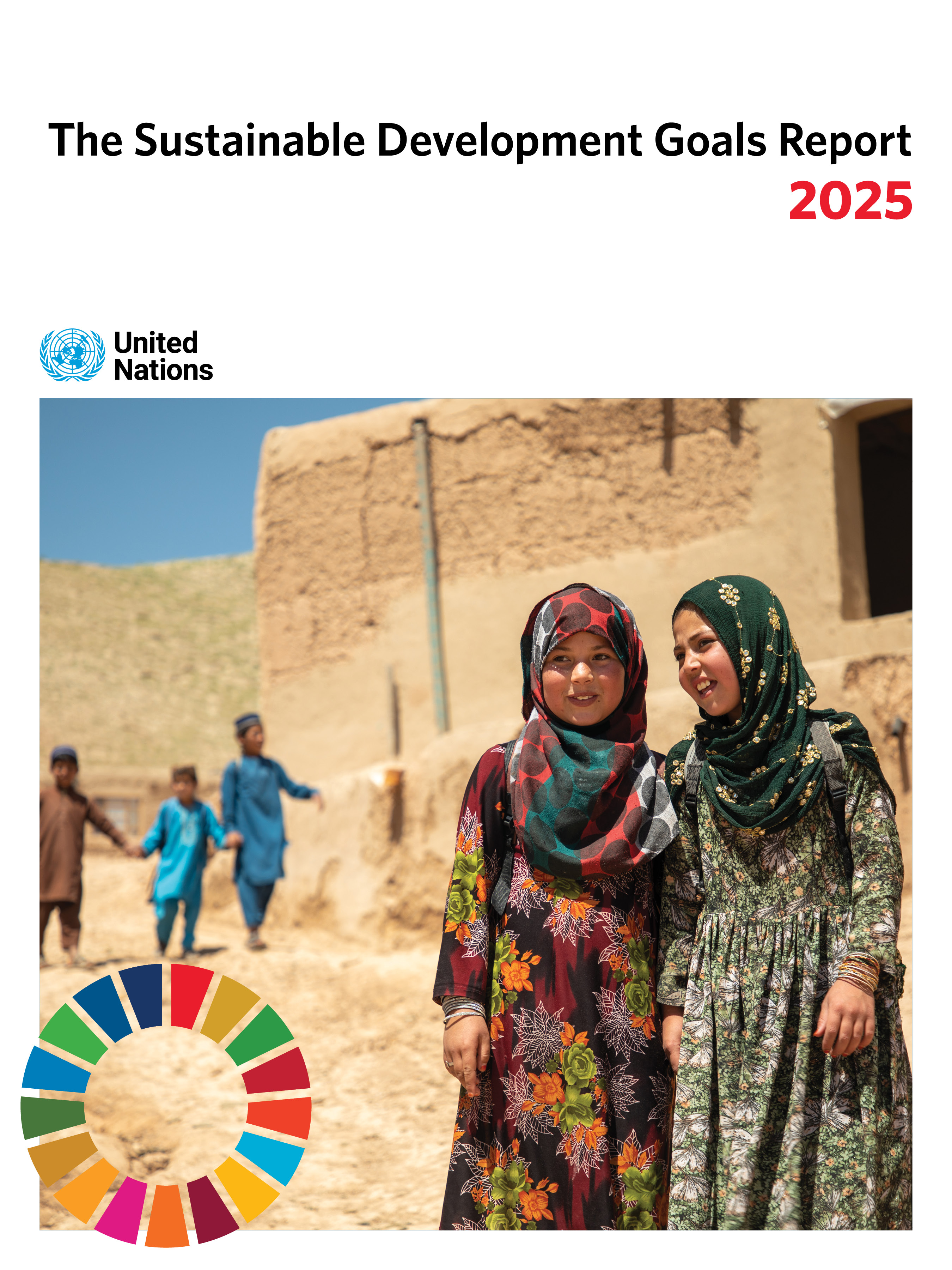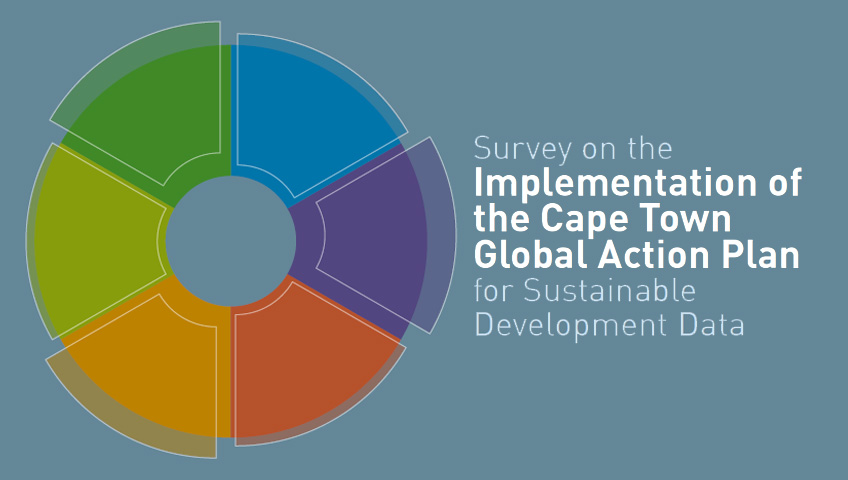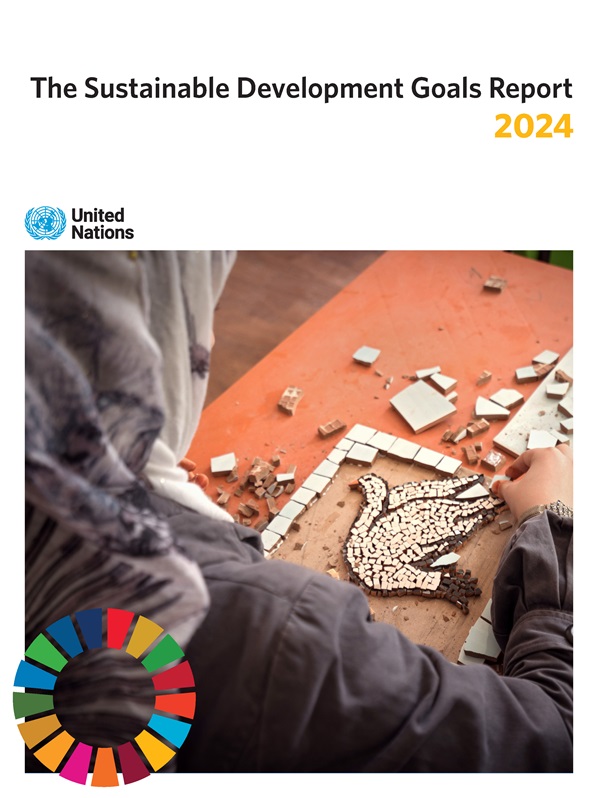Home
Welcome to the Sustainable Development Goal indicators website
A robust follow-up and review mechanism for the implementation of the 2030 Agenda for Sustainable Development requires a solid framework of indicators and statistical data to monitor progress, inform policy and ensure accountability of all stakeholders. The global indicator framework was adopted by the General Assembly on 6 July 2017 and is contained in the Resolution adopted by the General Assembly on Work of the Statistical Commission pertaining to the 2030 Agenda for Sustainable Development (A/RES/71/313).
Latest News
Launch of The Sustainable Development Goals Report 2025

14 July 2025: The Sustainable Development Goals Report 2025 marks the tenth annual stocktaking of global progress toward the 2030 Agenda for Sustainable Development. With the 2030 deadline only five years away, the report delivers a stark assessment: the Sustainable Development Goals have improved millions of lives, but the current pace of change is insufficient to fully achieve all the Goals by 2030.
The report reveals real and substantial development gains during the past decade. Since 2015, the world has made notable strides in expanding access to education, improving maternal and child health, and bridging the digital divide. Effective prevention efforts have significantly reduced the burdens of infectious diseases such as HIV and malaria. Access to electricity has continued to grow, and renewable energy is now the fastest-rising source of power worldwide.
Yet progress has been fragile and unequal. Millions still face extreme poverty, hunger, inadequate housing, and a lack of basic services. Women, people with disabilities, and marginalized communities continue to face systemic disadvantages. Escalating conflicts, climate chaos, rising inequalities, and soaring debt servicing costs are holding back further advancements.
Despite these setbacks, national and local success stories showcased in the report – such as universal electricity access in 45 countries and the elimination of neglected tropical diseases in 54 countries – demonstrate that accelerated progress is not only possible but already happening. The report calls for action in six priority areas: food systems, energy access, digital transformation, education, jobs and social protection, and climate and biodiversity. It also urges increased international cooperation and sustained investment to turn the ambition of the 2030 Agenda into reality.
2025 Comprehensive Review Call for proposals is now open

In accordance with GA Resolution 71/313, the Inter-Agency and Expert Group on Sustainable Development Goal Indicators (IAEG-SDGs) is opening the call for replacement, revision/adjustment, deletion and additional indicator proposals for consideration as part of the 2025 Comprehensive Review. The group will review these proposals to prepare a preliminary list of a proposal of indicator changes for inclusion in an open consultation in July 2024.
The open call for proposals is from 1 to 30 April 2024. All submissions must be received by 30 April 2024.
For the guiding principles, criteria and requirements for the 2025 Comprehensive Review, as well as the process to submit a proposal, please visit https://unstats.un.org/sdgs/iaeg-sdgs/2025-comprehensive-review/.
Launch of the UN Data Commons for SDGs

On Monday, 18 September 2023, during the SDG Summit, the UN Statistics Division, partnering with Google.org launched UN Data Commons for the SDGs. This new platform integrates authoritative SDG data and insights from across the UN System into a public repository with advanced search functionality and an innovative, user-friendly interface. Its aim is to put high-quality dataset s and digital public goods at users’ fingertips, allowing for seamless exploration of diverse statistical datasets, the annual global SDG report, and analytics, to ultimately facilitate informed data-driven decisions.
The platform, built by the Statistics Division of the UN Department of Economic Affairs, in collaboration with Google’s Data Commons, harnesses open, high-quality data from across the UN System, as well as cutting-edge technologies like Artificial Intelligence/Machine Learning (AI/ML), to make key SDG data and insights available to a diverse global audience, including policymakers, journalists, academics, and the public.
Key features include:
- Easily explore and download SDG data by country, region and Goal
- Advanced search functionality for SDG data insights
- SDG data and data stories together in one place
- Tools to explore and visualize SDG data
- Official SDG data available in Google’s Data Commons for further exploration
UN Data Commons for the SDGs is part of the UN Data modernization initiative, which aims to provide a single entry-point for official data and statistics from across the UN System. Over time, the UN Data Commons platform will integrate an increasing number of authoritative datasets from across the UN System and release powerful tools for accessing and interacting with data in an intuitive, easy-to-use way. The UN Data Commons is spearheaded by the UN, with initial funding from Google.org.
Link to webpage: https://unstats.un.org/UNSDWebsite/undatacommons/sdgs
Check out the latest blog on our collaboration with Google here
Updates to the Global SDG Data Platform (March 2022)

On 23 September 2021, the new Global SDG Indicators Data Platform was launched. The platform includes four components: a new, user-friendly interface to the Global Sustainable Development Goal Indicators Database, access to the SDG Country Profiles, the entirely new SDG Analytics and Advanced Access options.
On 07 March 2022, important updates (and some fixes) to the Global SDG Indicators Data Platform have been deployed in a second release. These include the ability of users to save and share their queries, improved query navigation and data download in SDG Analytics, and dramatically improved access to SDG indicators metadata in machine-readable format via an SDMX API. The SDG Analytics now also includes the ability to review the availability of disaggregated data at the most elementary level. One important 'fix' provides greater clarity in the query selection of countries and areas in the Global SDG Indicators Database. These updates are based on the feedback of users. Please share any Questions and Feedback.
Launch of the report of the Survey on the Implementation of the Cape Town Global Action Plan for Sustainable Development Data (February 2022)

The report of a Survey on the Implementation of the Cape Town Global Action Plan for Sustainable Development Data was published on 3 February 2022, presenting the responses of over 100 National Statistical Offices from all regions. The survey, which was conducted in partnership between the Statistics Division of the Department of Economic and Social Affairs, the World Bank, and PARIS21, will inform further actions by decision makers and international partners to implement, monitor, and finance the CTGAP. Since its launch in January 2017 at the first UN World Data Forum in South Africa, and its formal adoption by the United Nations Statistical Commission at its forty-eighth session in March 2017, the Cape Town Global Action Plan for Sustainable Development Data (CTGAP) has provided a framework for planning and implementing the statistical capacity building activities needed to achieve the scope and intent of the 2030 Agenda for Sustainable Development, and to mobilize funding for the modernization of national statistical systems across the world.
QUICK LINKS
- 2030 Agenda for Sustainable Development
- SDGs Database
- 2025 Comprehensive Review Process
- Survey on the Implementation of the Cape Town Global Action Plan for Sustainable Development
Data

- SG's progress report 2024
- Statistical Annex 2024
- SDGs report 2024

- Gender Snapshot 2024
- UN Data Commons for the SDGs
-

- Medellin Framework for action on data for sustainable development
- Hangzhou Declaration
- Bern Data Compact
- Cape Town Global Action Plan for Sustainable Development Data
- Dubai Declaration
- Global data community's response to Covid-19
- Statistical Commission